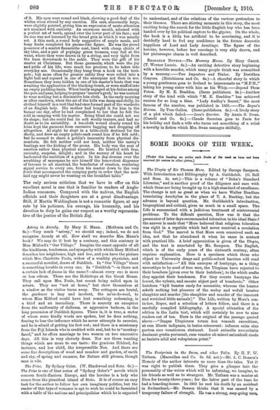SOME BOOKS OF TIIE WEEK.
[Under this heading trs notice such Books of ths week as Lave not 4,1* massed for swims ia other forms.] The Utopia of Sir Thomas More. Edited by George Sampson. With Introduction and Bibliography by A. Gutlikelch. (G. Boll and Sons. Cs. net.)—This is a volume of "Bohn's Standard Libraries," and is another proof of the diligence and care with which these are being brought up to a high standard of excellence. The change is not as great as when we have Walter Headlara translating Aeschylus in the place of T. A. Buckley, but the advance is beyond question. Mr. Guthkelch's introduction, biographical and critical, gives us much in a small space. The Life is summarised with a judicious treatment of, controversial problems. To the difficult question, How was it that the persecutor of later days recommended toleration in his ideal State ? the answer is made that "More believed that religious toleration was right in a republic which had never received a revelation from God." The marvel is that More even conceived such an idea, not that he abandoned it when he came in contact with practical life. A brief appreciation is given of the Utopia, and the text is annotated by Mr. Sampson. The English, which is of the early years of the sixteenth century, often requires explanation. Here is a specimen which those who object to University drags and public-school harriers will read with satisfaction :—" All this exercyse of huntynge, as a thing unworthye to be used of free men, the Utopians have rejected to their bouchers [given over to their butchers], to the which crafte they appoint their bondemen. For they count° huntynga the lowest, the vyleste, and. mooste abject part of boucherie."•• Other butchers " kyll beastes onely for necessitie, whereas the hunter seketh nothing but pleasure of the seeley and wofull beastes slaughter and murder [the slaughter and murder of the innocent and wretched little animals] " The Life, written by More's son- in-law, Roper, and a selection of letters follow, and there is a carefully compiled bibliography. A special attraction of the edition is the Latin 'text, which will certainly be new to nine readers out of ten. Hero is , the original of the passage quoted above :—"Itaque 17topienses totem hoc venandi exercitium, ut rem liberis indignam, in lanios reieeerunt: infimam maim Mils partem ewe venationem statunnt. Laaii animalia neceisitatis duntaxat gratia perimunk.cum venator ab miseri narlmalculicaodo se laniatu nibil nisi voluptatem petal."










































































 Previous page
Previous page